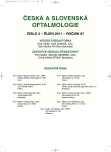-
Medical journals
- Career
Corneal Ulceration Complicating Surgical Correction of Ptosis in Patient with Kearns-Sayre Syndrome – a Case Report
Authors: T. Cesneková 1; T. Jurečka 2; K. Skorkovská 1; M. Tesařová 3; H. Hansíková 3; L. Wenchich 3; J. Zámečník 4; J. Zeman 3
Authors‘ workplace: Klinika nemocí očních a optometrie LF MU Fakultní nemocnice u svaté Anny, Brno, přednosta doc. MUDr. Svatopluk Synek, CSc. 1; Oční klinika NeoVize, Brno, prim. MUDr. Věra Kalandrová 2; Klinika dětského a dorostového lékařství VFN, 1. lékařská fakulta, Univerzita Karlova, Praha, přednosta prof. MUDr. Jiří Zeman, DrSc. 3; Ústav patologie a molekulární medicíny, 2. lékařská fakulta, Univerzita Karlova, Praha, přednosta prof. MUDr. Roman Kodet, CSc. 4
Published in: Čes. a slov. Oftal., 67, 2011, No. 4, p. 133-135
Category: Case Reports
Overview
The aim is to report a rare complication of surgical ptosis correction in a patient with Kearns Sayre syndrome and the therapeutic possibilities of its treatment.
Methods:
Exposure corneal ulceration caused by lagophtalmos developed gradually in a 30-year-old woman after an upper eyelid ptosis surgery of the right eye performed at another eye clinic. During an examination a limited movement of both eyes and retinal pigmentary changes (salt-pepper-like appearance) were diagnosed. A suspicion of the Kearns Sayre syndrome was expressed according to the clinical picture, the diagnosis was confirmed by molecular analyses in muscle biopsy, which revealed 5.2 kb deletion of mitochondrial DNA.Results:
Corneal ulceration was treated by partial external tarsorrhaphy and frequent instillation of lubricants. The upper eyelid ptosis of the left eye was treated with a spectacle with ptosis support.Conclusion:
During the correction of upper eyelid ptosis in patients with progressive external ophtalmoplegia it is necessary to be aware of the risk of surgical exposure keratopathy and corneal ulceration due to the atony of musculus orbicularis oculi muscle and only slightly expressed Bell’s phenomenon.Key words:
Kearns-Sayre syndrome, blepharoplasty of ptosis, exposure keratopathy, corneal ulceration
Sources
1. Becerra, EM, Blanco, G, MuiĖos, Y et al.: Surgical treatment of acquired myogenic eyelid ptosis, J Craniofac Surg, 2006 Mar; 17(2): 246–54.
2. Daut, PM, Steinemann, TL, Westfall, CT: Chronic exposure keratopathy complicating surgical correction of ptosis in patients with chronic progressive external ophthalmoplegia, Am J Ophthalmol. 2000 Oct; 130(4): 519–21.
3. De Wilde, F, D‘Haens, M, Smet, H et al.: Surgical treatment of myogenic blepharoptosis Review, Bull Soc Belge Ophtalmol. 1995; 255 : 139–46.
4. http://cs.wikipedia.org/wiki/Myorelaxans.
5. Jurečka, T., Zámečník, J., Hansíková, H.: Kazuistika 8. In Jirásková, N., Rozsíval, P., (Eds) Kazuistiky z ftalmologie II, Nucleus HK, 2008, 46–52.
6. Kraus, H. a kol.: Kompendium očního lékařství, Grada Publishing, 1999, 63–64.
7. Otradovec, J.: Klinická neurooftalmologie, Grada Publishing, a.s., 2003, 303 až 306.
8. Park, SB, Ma, KT, Kook, KH et al.: Kearns-Sayre syndrome – 3 case reports and review of clinical feature, Yonsei Med J. 2004 Aug 31; 45(4): 727–35.
9. Schmitz, K, Lins, H, Behrens-Baumann, W: Bilateral spontaneous corneal perforation associated with complete external ophthalmoplegia in mitochondrial myopathy (kearns-sayre syndrome), Cornea. 2003 Apr; 22(3): 267–70.
Labels
Ophthalmology
Article was published inCzech and Slovak Ophthalmology

2011 Issue 4-
All articles in this issue
- Morphologic Changes of Anterior Segment of the Eye after Cataract Surgery
- Benefit of Paint Diodlasercoagulation in the Treatment of ROP
- Long Term Results of Laser Refractive Operations – Methods Epi-LASIK or LASEK
- Innovations in the Treatment of the Macular Edema in Retinal Venous Occlusions
- Corneal Ulceration Complicating Surgical Correction of Ptosis in Patient with Kearns-Sayre Syndrome – a Case Report
- Unilateral Cystoid Macular Edema Induced by Citalopram – a Case Report
- Retinitis Septica Roth – a Case Report
- Czech and Slovak Ophthalmology
- Journal archive
- Current issue
- Online only
- About the journal
Most read in this issue- Unilateral Cystoid Macular Edema Induced by Citalopram – a Case Report
- Morphologic Changes of Anterior Segment of the Eye after Cataract Surgery
- Long Term Results of Laser Refractive Operations – Methods Epi-LASIK or LASEK
- Innovations in the Treatment of the Macular Edema in Retinal Venous Occlusions
Login#ADS_BOTTOM_SCRIPTS#Forgotten passwordEnter the email address that you registered with. We will send you instructions on how to set a new password.
- Career

